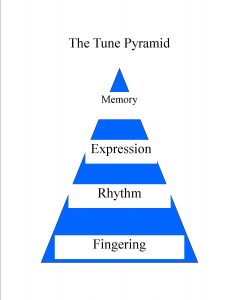
In addition to being musical, playing the bagpipe is all about precision.
There’s no denying that our instrument is very loud. Because of that, it not only needs to be tuned to precision, but it needs to be played to precision. In most cases, we memorize all the music we play. We also play 99% of the music we play in bands in “unison” with other players. That means we’re all playing the same thing.. That’s different than players in many other kinds of ensembles. For example, if you play in a jazz band and you make a mistake, you can claim that as “improvising”. Most listeners aren’t going to pick up on that since everyone in the group is playing something different. That’s not the case for us.
So, how do you learn to memorize tunes effectively and efficiently so that you can obtain that precision?
For the best precision, I like to suggest the “Tune Pyramid”.
It all starts at the bottom with fingering. If you want to be a good bagpiper, one of the strongest parts of your playing should be fingering. You need to practice and master playing not only the melodies but all of the ornamentation that goes with that. When you are learning a new tune, you should strive to play every single note, period. Don’t move to the next position until you have thought about it first. The first reading is very critical and is w
hy preciseness begins. After that, I believe that if you play a tune 10 times in a row, exactly the same way, you will have it memorized.
Analyzing the rhythm before you start your fingering practice will certainly help you master the tune sooner rather than later. The problems happen when you race your way sloppily through the initial readings. It’s like a document in Word. Every time you make a change and save that document, it is a different document. When you’re in a hurry and lack precision in your reading of the tune, you must go back and fix problems that you created because you were hasty, taking even longer to learn the tune and memorize it.
In the pyramid, you can’t have rhythm, expression or a memorized tune if you can’t finger it properly. You can’t have musical expression unless you have fingering and rhythm. Therefore, every layer of the Tune Pyramid is dependent on the layer underneath.
Make it a habit to learn your tunes as slowly as possible so that you don’t need to constantly stop for corrections or revisions. More importantly, you should isolate and practice technique in warm-ups before learning your tunes.
Just some food for thought…


0 Comments